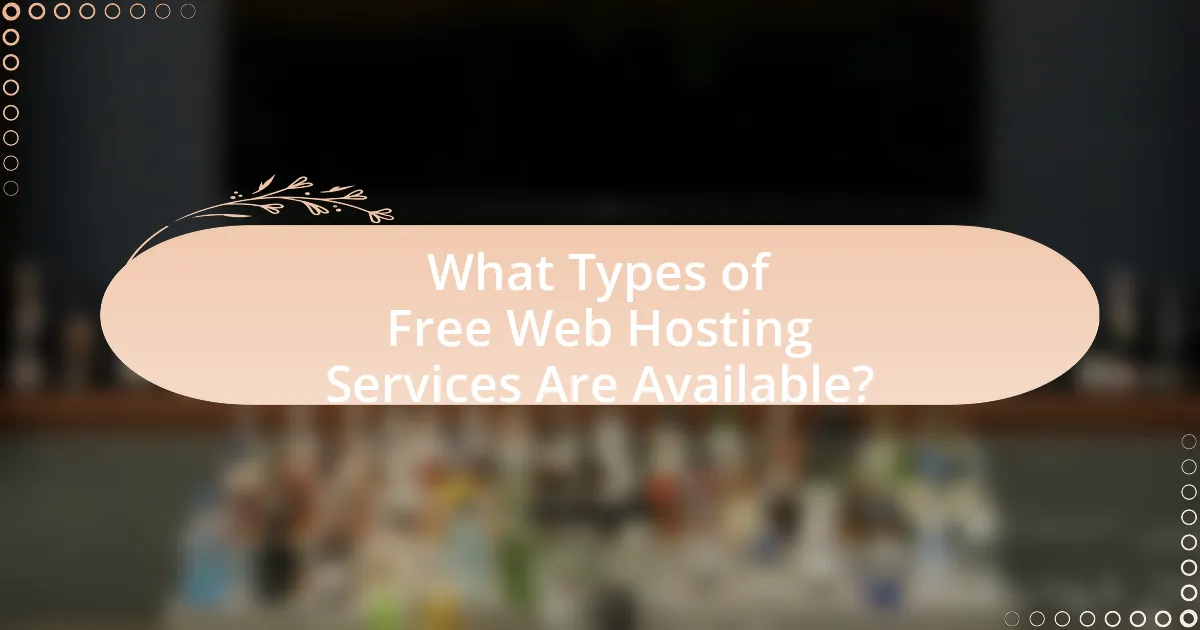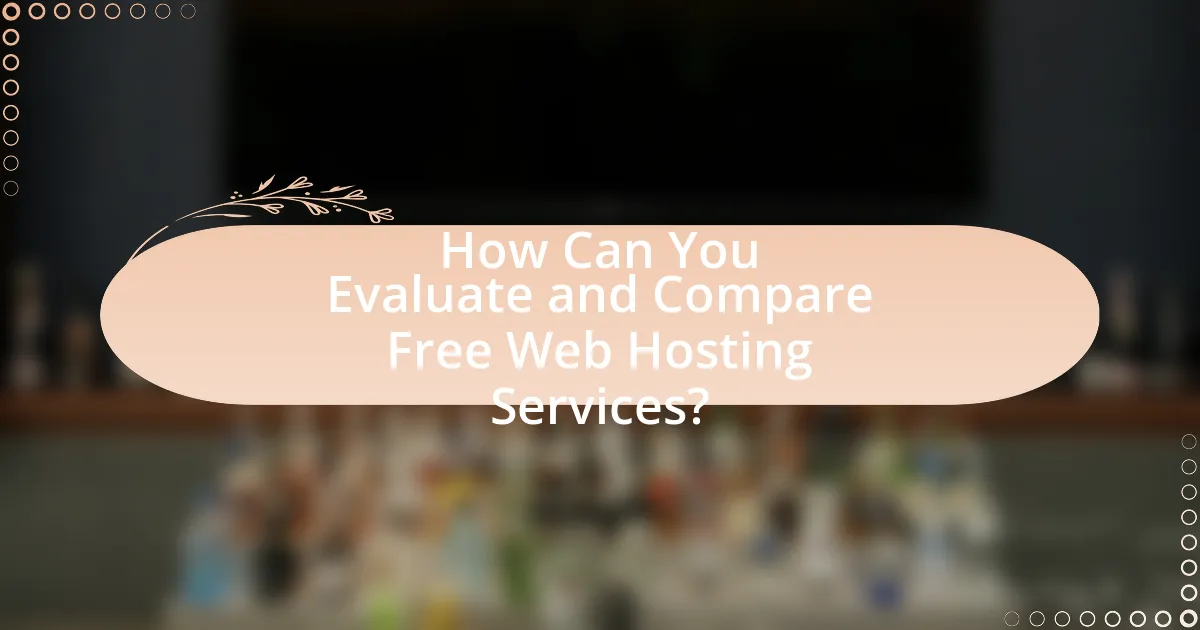The article focuses on selecting the best free web hosting service tailored to individual needs. It outlines critical considerations such as storage and bandwidth limitations, customer support quality, security features, and the impact of advertisements on user experience. Additionally, it discusses how specific website requirements, expected traffic, and key features influence the choice of hosting services. The article also compares different types of free hosting options, evaluates their performance, and provides best practices for optimizing website functionality and security on free platforms.

What Should You Consider When Choosing a Free Web Hosting Service?
When choosing a free web hosting service, consider the limitations on storage and bandwidth, as these factors directly affect your website’s performance and accessibility. Many free hosting providers impose strict caps on both, which can lead to slow loading times or downtime if exceeded. Additionally, evaluate the level of customer support offered, as free services often provide limited assistance, making it challenging to resolve issues quickly. Security features are also crucial; some free hosts may lack essential protections, leaving your site vulnerable to attacks. Lastly, check for ads on your site, as many free hosting services display their advertisements, which can detract from your site’s professionalism and user experience.
How do your specific needs influence your choice of web hosting service?
Your specific needs significantly influence your choice of web hosting service by determining the features, performance, and support required for your website. For instance, if you need high storage capacity for media files, you would prioritize hosting services that offer ample disk space and bandwidth. Additionally, if your website requires specific software or programming languages, such as PHP or WordPress, you would select a hosting provider that supports those technologies. According to a survey by HostingAdvice, 70% of users reported that their choice of hosting service was primarily based on their specific requirements, highlighting the importance of aligning hosting features with individual needs.
What type of website are you planning to host?
I am planning to host a personal blog website. Personal blogs typically focus on individual experiences, opinions, or hobbies, allowing for creative expression and engagement with an audience. According to a 2021 report by Statista, there were over 600 million blogs worldwide, indicating a significant interest in personal blogging as a medium for sharing content and connecting with others.
How much traffic do you expect to receive?
The expected traffic for a website using a free web hosting service typically ranges from 1,000 to 10,000 visitors per month. This estimate is based on common usage patterns observed in similar setups, where factors such as niche, content quality, and promotional efforts significantly influence traffic levels. For instance, a blog focused on a popular topic may attract more visitors compared to a niche site with limited reach. Additionally, many free hosting services impose bandwidth limits, which can further restrict the amount of traffic a site can handle effectively.
What are the key features to look for in a free web hosting service?
Key features to look for in a free web hosting service include storage space, bandwidth, uptime reliability, customer support, and ease of use. Storage space determines how much data you can host, while bandwidth affects the amount of traffic your site can handle. Uptime reliability is crucial, as a service with 99.9% uptime ensures your site remains accessible. Customer support is important for resolving issues quickly, and ease of use allows for straightforward website management. These features collectively enhance the functionality and reliability of a free web hosting service.
What storage and bandwidth limits should you be aware of?
When selecting a free web hosting service, you should be aware that storage limits typically range from 500 MB to 5 GB, while bandwidth limits often fall between 1 GB to 10 GB per month. These limits can significantly affect your website’s performance and accessibility. For instance, a service with only 1 GB of bandwidth may not support high traffic, leading to slow loading times or downtime. Additionally, many free hosting providers impose restrictions on storage and bandwidth to encourage users to upgrade to paid plans, which can limit your website’s growth potential.
How important is customer support for your hosting needs?
Customer support is crucial for hosting needs, as it directly impacts the reliability and performance of a website. Effective customer support ensures that issues are resolved quickly, minimizing downtime and maintaining user satisfaction. According to a survey by Zendesk, 82% of customers have stopped doing business with a company due to poor customer service, highlighting the importance of responsive support in the hosting industry. Additionally, hosting providers with robust customer support often receive higher satisfaction ratings, which can be a deciding factor for users when selecting a service.
What are the potential drawbacks of using free web hosting services?
Using free web hosting services can lead to several potential drawbacks, including limited storage and bandwidth, lack of customer support, and the presence of advertisements on your site. Limited storage and bandwidth can restrict the growth of your website, as many free services impose strict caps that may hinder performance during high traffic periods. The absence of reliable customer support can result in prolonged downtime or unresolved technical issues, negatively impacting user experience. Additionally, advertisements placed by the hosting provider can detract from your site’s professionalism and user engagement, as they often appear without your control or consent. These factors collectively can undermine the effectiveness and credibility of a website hosted on a free platform.
What limitations might affect your website’s performance?
Website performance can be affected by limitations such as bandwidth restrictions, server uptime, and resource allocation. Bandwidth restrictions can lead to slow loading times, especially during peak traffic periods, as free hosting services often impose limits on data transfer. Server uptime is critical; if the hosting provider experiences frequent outages, the website will be inaccessible, negatively impacting user experience and search engine rankings. Additionally, limited resource allocation, such as CPU and memory, can hinder the website’s ability to handle multiple requests simultaneously, resulting in slow performance or crashes. These factors collectively determine the overall effectiveness and reliability of a website hosted on a free service.
How can ads on free hosting services impact user experience?
Ads on free hosting services can significantly detract from user experience by creating visual clutter and interrupting content consumption. Users often find ads distracting, which can lead to frustration and decreased engagement with the hosted content. A study by the Nielsen Norman Group found that excessive advertising can reduce user satisfaction and increase bounce rates, as users may leave the site to avoid intrusive ads. Additionally, ads can slow down page loading times, further diminishing the overall experience. Therefore, the presence and nature of ads on free hosting services directly influence how users interact with and perceive the quality of the service.

What Types of Free Web Hosting Services Are Available?
There are several types of free web hosting services available, including shared hosting, cloud hosting, and website builders. Shared hosting allows multiple users to host their websites on a single server, which is cost-effective but may lead to slower performance due to resource sharing. Cloud hosting utilizes a network of servers to host websites, providing scalability and reliability, while website builders offer integrated hosting solutions with user-friendly interfaces for easy site creation. Each type serves different needs, making it essential to evaluate specific requirements when choosing a free web hosting service.
What are the different categories of free web hosting services?
The different categories of free web hosting services include shared hosting, cloud hosting, and website builders. Shared hosting allows multiple users to share server resources, making it cost-effective but often limited in performance. Cloud hosting utilizes a network of servers to provide scalable resources, offering better reliability and uptime. Website builders combine hosting with user-friendly design tools, enabling users to create websites without technical knowledge. Each category serves distinct needs, catering to various user requirements and technical expertise.
What is the difference between shared hosting and cloud hosting?
Shared hosting involves multiple websites sharing a single server’s resources, which can lead to performance issues during high traffic, while cloud hosting utilizes a network of virtual servers to distribute resources, offering scalability and reliability. In shared hosting, users have limited control and resources, whereas cloud hosting provides greater flexibility and the ability to handle varying traffic loads efficiently. This distinction is crucial for users who require consistent performance and scalability, as cloud hosting can adapt to changing demands without downtime, unlike shared hosting which may struggle under heavy loads.
How do website builders compare to traditional hosting services?
Website builders offer an all-in-one solution that combines website creation and hosting, while traditional hosting services require users to build their websites separately. Website builders typically provide user-friendly interfaces, templates, and integrated tools for design and content management, making them accessible for non-technical users. In contrast, traditional hosting services offer more flexibility and control over server configurations and software choices, appealing to developers and businesses with specific needs. According to a 2021 survey by HostingAdvice, 60% of users prefer website builders for their ease of use, while 40% opt for traditional hosting for greater customization options.
Which free web hosting services are most popular and why?
The most popular free web hosting services are WordPress.com, Wix, and InfinityFree due to their user-friendly interfaces, robust features, and strong community support. WordPress.com is favored for its extensive customization options and a large library of themes and plugins, making it ideal for bloggers and small businesses. Wix stands out for its drag-and-drop website builder, allowing users to create visually appealing sites without coding knowledge. InfinityFree is popular for offering unlimited disk space and bandwidth, appealing to users who need more resources without cost. These services attract users by providing essential features for website creation and management without financial commitment.
What features make certain services stand out?
Certain features make web hosting services stand out, including reliability, speed, customer support, and scalability. Reliability is crucial, as services with high uptime percentages, typically above 99.9%, ensure that websites remain accessible. Speed is also essential; hosting providers that utilize solid-state drives (SSDs) can significantly enhance loading times, improving user experience and SEO rankings. Customer support is vital, with 24/7 availability and multiple contact methods being indicators of a service that prioritizes user assistance. Scalability allows users to upgrade their hosting plans easily as their website grows, ensuring that the service can adapt to changing needs. These features collectively contribute to a service’s overall effectiveness and user satisfaction.
How do user reviews influence the reputation of these services?
User reviews significantly influence the reputation of web hosting services by shaping potential customers’ perceptions and decisions. Positive reviews enhance credibility and attract new users, while negative reviews can deter potential customers and damage the service’s reputation. Research indicates that 84% of people trust online reviews as much as personal recommendations, highlighting their impact on consumer behavior. Additionally, platforms like Trustpilot and Google Reviews aggregate user feedback, making it easily accessible and influential in shaping the overall reputation of these services.

How Can You Evaluate and Compare Free Web Hosting Services?
To evaluate and compare free web hosting services, assess key factors such as storage space, bandwidth, uptime reliability, customer support, and features offered. Storage space indicates how much data you can store, while bandwidth affects the amount of traffic your site can handle. Uptime reliability, typically measured as a percentage, reflects the service’s availability; a reliable host should offer at least 99.9% uptime. Customer support options, including live chat and email, are crucial for resolving issues quickly. Additionally, consider features like website builders, templates, and the ability to use your own domain. These criteria provide a comprehensive framework for making informed comparisons among various free web hosting options.
What criteria should you use to compare different hosting services?
To compare different hosting services, evaluate criteria such as uptime reliability, speed performance, customer support, pricing, and scalability options. Uptime reliability indicates the percentage of time the service is operational, with a benchmark of 99.9% being standard in the industry. Speed performance affects website loading times, which can impact user experience and SEO rankings; services should ideally offer fast server response times. Customer support quality is crucial, as responsive and knowledgeable support can resolve issues quickly; look for 24/7 availability and multiple contact methods. Pricing should be transparent, with no hidden fees, and should align with the features offered. Lastly, scalability options allow for future growth, ensuring that the hosting service can accommodate increased traffic or resource needs without significant disruptions.
How do uptime guarantees affect your website’s reliability?
Uptime guarantees directly enhance a website’s reliability by ensuring that the site remains accessible to users for a specified percentage of time, typically expressed as a percentage like 99.9%. This assurance means that if a hosting provider commits to a high uptime percentage, it is likely to invest in robust infrastructure, regular maintenance, and effective support systems to minimize downtime. For instance, a study by the IT research firm Gartner indicates that even a 1% downtime can lead to significant revenue loss, emphasizing the importance of uptime guarantees in maintaining consistent website availability.
What role does scalability play in your hosting decision?
Scalability is crucial in hosting decisions as it determines the ability of a hosting service to accommodate growth in website traffic and resource demands. A scalable hosting solution allows businesses to easily upgrade their resources, such as bandwidth and storage, without significant downtime or migration issues. For instance, a study by HostingAdvice found that 70% of businesses experience increased traffic during peak seasons, highlighting the need for flexible hosting options that can adapt to varying demands. Therefore, choosing a hosting provider that offers scalable solutions ensures that a website can grow alongside its audience, maintaining performance and reliability.
How can you test the performance of a free web hosting service?
To test the performance of a free web hosting service, you can conduct speed tests, uptime monitoring, and load testing. Speed tests can be performed using tools like GTmetrix or Pingdom, which measure page load times and provide insights into performance bottlenecks. Uptime monitoring can be done with services like UptimeRobot, which checks the availability of your website at regular intervals, ensuring that the hosting service remains operational. Load testing can be executed using tools such as Apache JMeter, which simulates multiple users accessing the site simultaneously, helping to identify how well the hosting service handles traffic spikes. These methods provide concrete data on the performance and reliability of the free web hosting service.
What tools can help you assess loading speeds and uptime?
Tools that can help assess loading speeds and uptime include Google PageSpeed Insights, GTmetrix, and Pingdom. Google PageSpeed Insights analyzes the content of a web page and provides suggestions to make it faster, while GTmetrix offers detailed performance reports and recommendations based on various metrics. Pingdom monitors website uptime and performance, providing alerts when downtime occurs. These tools are widely used in the industry, with Google PageSpeed Insights being a trusted resource backed by Google’s extensive data on web performance.
How can you evaluate customer support responsiveness?
To evaluate customer support responsiveness, measure the average response time to inquiries and the resolution time for issues. Research indicates that effective customer support typically responds within 24 hours, with top-performing services achieving responses in under an hour. Additionally, assess the availability of support channels, such as live chat, email, and phone support, as well as customer satisfaction ratings, which can be found in user reviews and surveys. These metrics provide a comprehensive view of how responsive a customer support team is in addressing user needs.
What are some best practices for using free web hosting services?
To effectively use free web hosting services, prioritize selecting a reputable provider that offers reliable uptime and customer support. Many free hosting services come with limitations such as bandwidth restrictions and lack of technical support, which can hinder website performance. Research user reviews and performance metrics to ensure the chosen service meets your needs. Additionally, regularly back up your website data, as free hosting providers may not offer automated backups, increasing the risk of data loss. Lastly, be aware of the terms of service, as some free hosts may impose restrictions on content or monetization, which could affect your website’s growth and functionality.
How can you optimize your website for better performance on free hosting?
To optimize your website for better performance on free hosting, focus on minimizing file sizes and reducing server requests. Compress images and use formats like WebP to decrease load times, as studies show that optimized images can reduce page size by up to 80%. Additionally, implement browser caching to store static resources, which can improve load speed by up to 50% for returning visitors. Use a Content Delivery Network (CDN) to distribute content globally, enhancing access speed; CDNs can reduce latency by serving content from the nearest server. Finally, streamline your code by removing unnecessary scripts and styles, which can lead to faster rendering times, as clean code can improve performance by 20-30%.
What steps can you take to ensure security on a free hosting platform?
To ensure security on a free hosting platform, implement strong passwords and enable two-factor authentication. Strong passwords reduce the risk of unauthorized access, while two-factor authentication adds an additional layer of security by requiring a second form of verification. Regularly update software and plugins to patch vulnerabilities, as outdated systems are prime targets for attacks. Additionally, utilize secure protocols such as HTTPS to encrypt data transmitted between the server and users, protecting sensitive information from interception. Regularly back up data to prevent loss in case of a security breach, and monitor website activity for any suspicious behavior. These steps collectively enhance the security posture of a website hosted on a free platform.